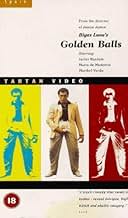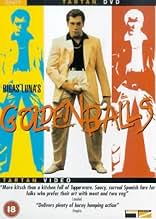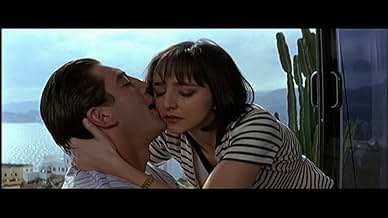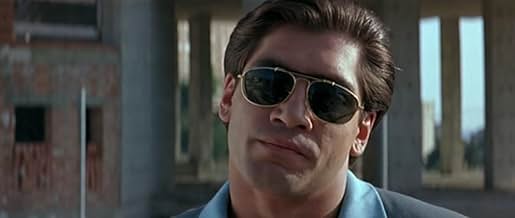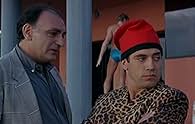IMDb रेटिंग
6.1/10
4.1 हज़ार
आपकी रेटिंग
एक लुभावनी निर्माण श्रमिक अपने महत्वाकांक्षी सपने के परियोजना के लिए धन जुटाने के अनौपचारिक तरीकों का पालन करता है.एक लुभावनी निर्माण श्रमिक अपने महत्वाकांक्षी सपने के परियोजना के लिए धन जुटाने के अनौपचारिक तरीकों का पालन करता है.एक लुभावनी निर्माण श्रमिक अपने महत्वाकांक्षी सपने के परियोजना के लिए धन जुटाने के अनौपचारिक तरीकों का पालन करता है.
- पुरस्कार
- 4 जीत और कुल 3 नामांकन
Alessandro Gassmann
- El amigo de Melilla
- (as Alessandro Gassman)
Benicio Del Toro
- El amigo de Miami
- (as Benisio Del Toro)
Francesco Maria Dominedò
- El Mosca
- (as Francesco Mª Dominedo)
Francisco Casares
- El productor
- (as Paco Casares)
फ़ीचर्ड समीक्षाएं
This film is Spanish. This statement is not as obvious as you might think. Bigas Luna makes films so rich in Spanish cultural references that it is true that without previous knowledge, or better yet experience, of Spain then much of the film's charm will be lost. He parodies the stereotypes of spanish culture- the macho male most obviously, but there are numerous others- in such a way that anyone who accuses the characters of being over the top and unbelievable would very nearly be fully justified, if it wasn't that they are so instantly recognizable. Javier Bardem's character has wonderfully kitsch taste, most notably his attire and the obsession he has with Salvador Dali (to the point of outlining the famous 'drawers' across the bodies of all the women in his life). This goes a long way to creating the visual style which is somehow spot on for the mediterranean coast. The story itself is quite touching in the end, as a man of great passion and ambition rises from having nothing to having all he desires before the inexorable decent commences. There is much symbolism in this film for those who enjoy it. For example Bardem aims to erect the tallest building in town, yet as it fails and crumbles, so does his sexual potency. This film is admittedly an aquired taste, not for people who thrive on the tried and tested Hollywood formulae, unless they are willing to explore into the exotic and foreign world of Bigas Luna.
With some films it is really hard to tell for whom they were made. Huevos de oro seems to aim at the well educated Spanish middle class. There must be many inside jokes in this movie which you will not understand if you are an outsider. This can be pretty annoying.
Symbols and references to art and popular culture abound, the movie alludes to the work of Salvador Dalí, Luis Buñuel and the Surrealists in general, a certain infatuation with bidet baths seems to point to Duchamp's ready mades. What's more, the main character has also a knack for karaoke tapes with songs of Julio Iglesias. But why all this is mixed together in a rather pretty but also gratuitous way simply eludes me. I can only guess that it all serves to highlight the vital, impetuous, boorish vulgarity of the main character who the director seems to admire and despise at the same time. How all the really pretty women run after him (the main character, I mean) is slightly disconcerting.
The movie has three parts. It starts in the Spanish enclave of Melilla in Africa, where Benito, the main character, does his military service, apparently in the corps of engineers. Then it moves on to the resort town of Benidorm in Spanin where Benito just wants to build the highest skyscraper of the place and become a vulgarized Howard Roark. For the last part a defeated Benito moves to Miami, Florida, presumably in order to start a new life". But the change of places is not really explained satisfactorily. It is also somehow irritating that there is no character development and that the movie descends into a soap opera modus without being convincingly ironic. It must be said that Javier Bardem acquits himself very well playing the young stud who grows limp and deflated.
I purchased this movie because I am interested in townscapes. And Benidorm is a kind of a special place, townscapewise. In this aspect Huevos de oro satisfied me only partially. In Jess Franco's She Killed In Ecstasy (1970) this specific location was used in a more rewarding way.
Symbols and references to art and popular culture abound, the movie alludes to the work of Salvador Dalí, Luis Buñuel and the Surrealists in general, a certain infatuation with bidet baths seems to point to Duchamp's ready mades. What's more, the main character has also a knack for karaoke tapes with songs of Julio Iglesias. But why all this is mixed together in a rather pretty but also gratuitous way simply eludes me. I can only guess that it all serves to highlight the vital, impetuous, boorish vulgarity of the main character who the director seems to admire and despise at the same time. How all the really pretty women run after him (the main character, I mean) is slightly disconcerting.
The movie has three parts. It starts in the Spanish enclave of Melilla in Africa, where Benito, the main character, does his military service, apparently in the corps of engineers. Then it moves on to the resort town of Benidorm in Spanin where Benito just wants to build the highest skyscraper of the place and become a vulgarized Howard Roark. For the last part a defeated Benito moves to Miami, Florida, presumably in order to start a new life". But the change of places is not really explained satisfactorily. It is also somehow irritating that there is no character development and that the movie descends into a soap opera modus without being convincingly ironic. It must be said that Javier Bardem acquits himself very well playing the young stud who grows limp and deflated.
I purchased this movie because I am interested in townscapes. And Benidorm is a kind of a special place, townscapewise. In this aspect Huevos de oro satisfied me only partially. In Jess Franco's She Killed In Ecstasy (1970) this specific location was used in a more rewarding way.
This is a generally enjoyable send-up of the excesses of the 1980's:- the get-rich quick, looking after no. 1 culture which prevailed for a mercifully brief period. The anti-hero is a cynical building contractor who will do anything to achieve his aim of making a fortune out of nothing, regardless of the law or of any loyalty to those closest to him. Needless to say, he gets his come-uppance and the final scene in which he smashes a lavatory to pieces is vintage Bigas Luna.
Unfortunately, it doesn't quite manage to keep up the same pace as "Jamon Jamon" and, particularly after about half way through, it starts to lose its momentum and the viewer starts to lose interest. But there are one or two scenes which are so funny that they alone make the film worth seeing, e.g. the three-in-a-bed scene in which he suddenly realises that he is not the fantastic lover he had always imagined he was.
Unfortunately, it doesn't quite manage to keep up the same pace as "Jamon Jamon" and, particularly after about half way through, it starts to lose its momentum and the viewer starts to lose interest. But there are one or two scenes which are so funny that they alone make the film worth seeing, e.g. the three-in-a-bed scene in which he suddenly realises that he is not the fantastic lover he had always imagined he was.
If the darkly comic tone of this film strikes you as a bit odd for what on the surface is a straight forward young-man-on-the-make drama, welcome to the world of Bigas Luna. What this is really is a satire on supposed masculine virtues in Latino culture. The main character, a wannabe real estate mogul played by Javier Bardem, throughout the film achieves material ambitions and rising to dominate others in classic alpha dog fashion, yet his victories seem hollow and shallow. This is all intended, but Luna was not aiming to create a morality play here. He just wanted to take cheap shots at talentless hacks who succeed on sheer chutzpah, and at cultures who lionize them for their successes however achieved. The main character could have been any ambitious rhymes-with-Rick in any field. One gets the idea that he might even have been based on somebody Luna knew from the film business...
So, announces the DVD. But, this was a disappointing film. Not particularly bad but definitely not that good. Rather more crude and MTV video-like than the more subtle and masterful Jamon Jamon.
None of the characters are likable, the lovely Penelope Cruz of Bigas Luna's first film replaced by vacuous supermodels (in comparison, maybe they are great actresses) and it all reads like a tawdry and cheap paperback that you'd pick up at motorway service station.
Which, maybe is how Luna wanted it. Maybe he really is that repelled by the capitalist, nouveau-riche alpha male who believes his 'balls' not only rule his life but everybody else's, too. I know I am, and most people would be, too. Asked why Javier Bardem's lead character is sporting two gold Rolex's, he announces back "I have two balls, so I have two Rolex's".
Artistically there is little merit to this film, but it is about overblown, over-macho stereotypes and how they think they can walk over everybody. There are nods to Dali (the nude with ants over her pubic region is an extreme example) and there are more phallic insinuations in Goldenballs than any other film I know of. From Gonzalez (Bardem) Towers, intended to be the tallest tower on the Med, in which Luna loosely stretches a fabric of some kind of story around, with his dodgy dealings and cost-cutting.
Like, possibly his Tower, Gonzalez, and his potent sexual erections, does come a cropper, which is of some redemption, admittedly, but not enough to save the film. There's an early role for Benecio del Torro as the Miami-set gardener who happens to do more than service the sprinkler....
What finally made me only award two stars was the poor DVD quality. It's of video standard, plain and simple.
I bought Goldenballs as I wanted the three films in Luna's 'Iberian passion' trilogy, of which it is the middle. I'm seriously hoping that the final part, 'The Tit and the Moon' is an improvement.
None of the characters are likable, the lovely Penelope Cruz of Bigas Luna's first film replaced by vacuous supermodels (in comparison, maybe they are great actresses) and it all reads like a tawdry and cheap paperback that you'd pick up at motorway service station.
Which, maybe is how Luna wanted it. Maybe he really is that repelled by the capitalist, nouveau-riche alpha male who believes his 'balls' not only rule his life but everybody else's, too. I know I am, and most people would be, too. Asked why Javier Bardem's lead character is sporting two gold Rolex's, he announces back "I have two balls, so I have two Rolex's".
Artistically there is little merit to this film, but it is about overblown, over-macho stereotypes and how they think they can walk over everybody. There are nods to Dali (the nude with ants over her pubic region is an extreme example) and there are more phallic insinuations in Goldenballs than any other film I know of. From Gonzalez (Bardem) Towers, intended to be the tallest tower on the Med, in which Luna loosely stretches a fabric of some kind of story around, with his dodgy dealings and cost-cutting.
Like, possibly his Tower, Gonzalez, and his potent sexual erections, does come a cropper, which is of some redemption, admittedly, but not enough to save the film. There's an early role for Benecio del Torro as the Miami-set gardener who happens to do more than service the sprinkler....
What finally made me only award two stars was the poor DVD quality. It's of video standard, plain and simple.
I bought Goldenballs as I wanted the three films in Luna's 'Iberian passion' trilogy, of which it is the middle. I'm seriously hoping that the final part, 'The Tit and the Moon' is an improvement.
क्या आपको पता है
- ट्रिवियाSecond part of Bigas Luna's "Iberian Trilogy" also including Jamon Jamon (1992) and The Tit and the Moon (1994).
- कनेक्शनReferenced in Two Girls and a Guy (1997)
- साउंडट्रैकHuevos de oro
(Theme)
By Nicola Piovani
Performed by the Orchestra dell'Unione Musicisti di Roma
Directed by Nicola Piovani
Violoncello soloist: Francesca Taviani
टॉप पसंद
रेटिंग देने के लिए साइन-इन करें और वैयक्तिकृत सुझावों के लिए वॉचलिस्ट करें
- How long is Golden Balls?Alexa द्वारा संचालित
विवरण
- रिलीज़ की तारीख़
- कंट्री ऑफ़ ओरिजिन
- आधिकारिक साइट
- भाषा
- इस रूप में भी जाना जाता है
- Huevos de oro
- फ़िल्माने की जगहें
- Villajoyosa, Alicante, Comunidad Valenciana, स्पेन(Playa Casco Antiguo)
- उत्पादन कंपनियां
- IMDbPro पर और कंपनी क्रेडिट देखें
बॉक्स ऑफ़िस
- बजट
- ESP 42,00,00,000(अनुमानित)
- चलने की अवधि1 घंटा 35 मिनट
- ध्वनि मिश्रण
- पक्ष अनुपात
- 2.39 : 1
इस पेज में योगदान दें
किसी बदलाव का सुझाव दें या अनुपलब्ध कॉन्टेंट जोड़ें


